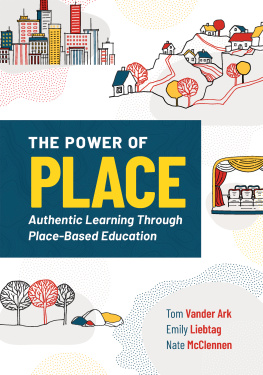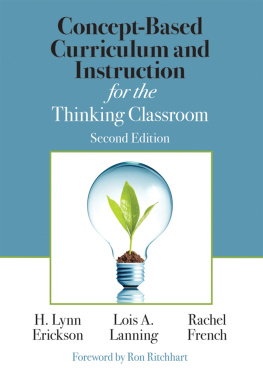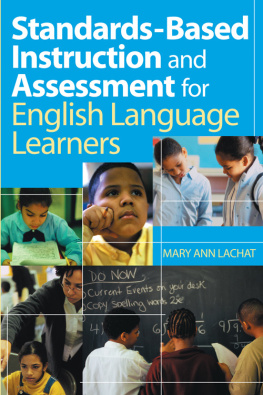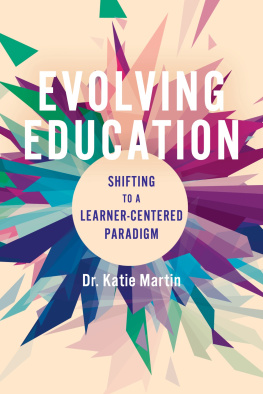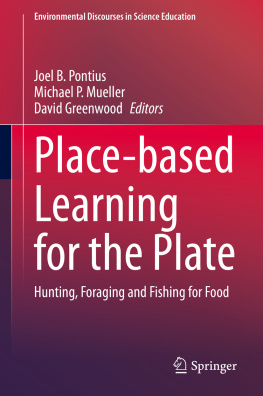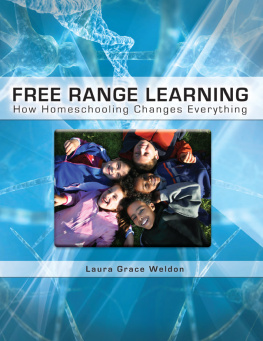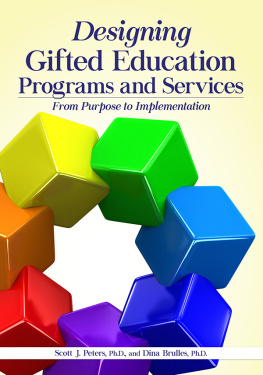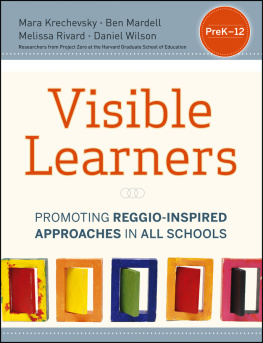Contents
Guide
Pages
Dedication
....................
Emily: Thanks to all of those who have supported us throughout the process of writing this book and to those educators and students who are the inspiration for this work. To all of you, may I help you deliver on your own dreams in the near or distant future.
Nate: I would like to thank my familyRachel, Kai, and Tayafor exploring our place with me through many adventures; my parents, who taught me the value of hard work, kindness, and the power of education; and all of the staff at Teton Science Schools for their contributions to a better world and their deep belief in place-based education.
Tom: Thanks to my parents for introducing me to the worldfor decades of moving me outside my psychological and physical comfort zone to places where I could learn and grow.
Acknowledgments
....................
We would like to acknowledge the countless educators who are providing young people with incredibly rich community-connected learning experiences every day. You fuel our work and provide us with hope, inspiration, and promise for a better future.
Thank you to all of the students who have inspired and challenged us along the way and to those who have made important contributions to their community and leaned into the power of place. We wrote this book for the millions of students who deserve better and richer learning experiences connected to their own communities.
We would also like to thank those who have supported our exploration, research, and writing. Thank you to ASCD for inviting us to write this book and to be a part of your exemplary cohort of authors. Thanks to the Getting Smart team, the Teton Science Schools team, the Carnegie Corporation, and others who started the push several years ago to amplify the place-based message, and who created many of the publications and resources mentioned in this book. Thanks to Carri Schneider for her contributions to the initial place-based campaign. We also want to acknowledge Education Reimagined for introducing us to students who are leading the way, many of whose stories and voices are featured in this book.
To the place-based pioneers who launched and have documented the modern educational system, including, among many others, Ray Barnhardt, Grace Lee Boggs, Greg Cajete, David Greenwood, Francisco Guajardo, Stephen Haymes, bell hooks, Oscar Kawagley, David Orr, Greg Smith, David Sobel, Paul Theobald, and Doris Williamsthank you for pursuing and prioritizing explorations of place. And thanks to the project-based learning pioneers who have inspired us.
We also recognize the thousands of community organizations, indigenous groups, informal and formal alliances, teachers, and schools that have implemented place-based education around the world for generations. This book is our humble effort to codify and advance the field to help more students learn locally.
And to our loved ones, we know we couldnt have completed this work without your understanding and support.
Preface: The Future of Place in Learning
....................
Well, in the ancient world, the word genius was not so much used about individual people, it was used about places, and almost always with the word loci. Genius loci meant "the spirit of a place." And we all know what that intuitively means. We all have favorite places in the world, and it may be a seashore where youve got this ancient conversation between the ocean and the land and a particular geography of the way the cliffs or the beaches are formed. But it couldve been the same in the ancient world. A little bridge crossing a stream with a pool at the back of it and a willow hanging over the pool; that place would be said to have a genius loci. But a more sophisticated understanding would [be that] its this weather front of all of these qualities that meet in that place. So I think its a very merciful thing to think of human beings in the same waythat is, your genius is just the way everything has met in you.
David Whyte, The Conversational Nature of Reality
We have all experienced the power of place: those moments when we are fully alive; when the sights, sounds, and smells of an experience stopped us in our tracks; when learning was organic and visceral. It may be a strange new place where the culture and colors are unfamiliar and simultaneously delightful and disconcerting. Or it may be the mundanean alley, a field, or a creekseen with new eyes.
Place: its where were from; its where were going. Place comes in layers; it is old and new at the same time. Place is central to human development; it is how we comprehend the world; it asks for our attention and care. If we pay attention, place has much to teach us.
We have largely stopped making use of place in formal education. All the reasons were well-intentioned but industrial: abstracted frameworks, standardized measures, and efficient facilities. The addition of mobile technology, which has the power to unlock anytime, anywhere learning, is primarily used to provide useful differentiation, but the addition of screen time has (in most places) reduced, not increased, connection to place. Formal learning experiences that leverage the power of place are now the exception and not the rule. We hope to change that.
With this book and our related work, we seek to help educators, advocates, and parents connect children with places near and far. We hope for more engagement and authenticity in education. We seek expanded access to community-connected challenges. We aim to leverage local assets including parks, public spaces, museums, and businesses for learning.
Why Place Matters to the Authors
The power of place has been realized time and again by educators we work with. Place-based education also has been integral to our own learning journeys, careers, and lives.
Emily: In my first couple of years as an elementary school teacher, I didnt pay much attention to where students were from or their connection to their communities (although I should have). Once I realized the value and strengths of these connections, I had an entirely new perspective on teaching and learning. I began to realize the incredible amount of untapped potential and creativity in the students that I was trying to contain in my traditional, four-walled classroom. My own most powerful learning experiences have been deeply rooted in place and connected to my communityso why wouldnt this also be true for my students?
There is nothing more incredible than witnessing one of natures finest phenomena, more invigorating than being uncomfortable and curious in a new culture or context, and more humbling than helping tackle an issue in your own community.
Nate: Something unexpected happens when you explore a community for the first time. Your worldview shifts with each question, each interaction, and each inquiry. You understand the place more deeply, and yet the deeper you go, the more you realize you have to learn. This is the power of placeits an infinite mystery that continually leads to awe and wonder.
Pragmatically, my most important learning has come from placein the outdoors, jobs, conversations, and explorationsall teaching skills and knowledge that were just as important as what I learned in school. I see that I can make an impact. I see that I can always learn. And I see that my actions create ripple effects across ecosystems and nations. This is what our young people need to learnthat they matter and that it starts with understanding and appreciating their local place.

